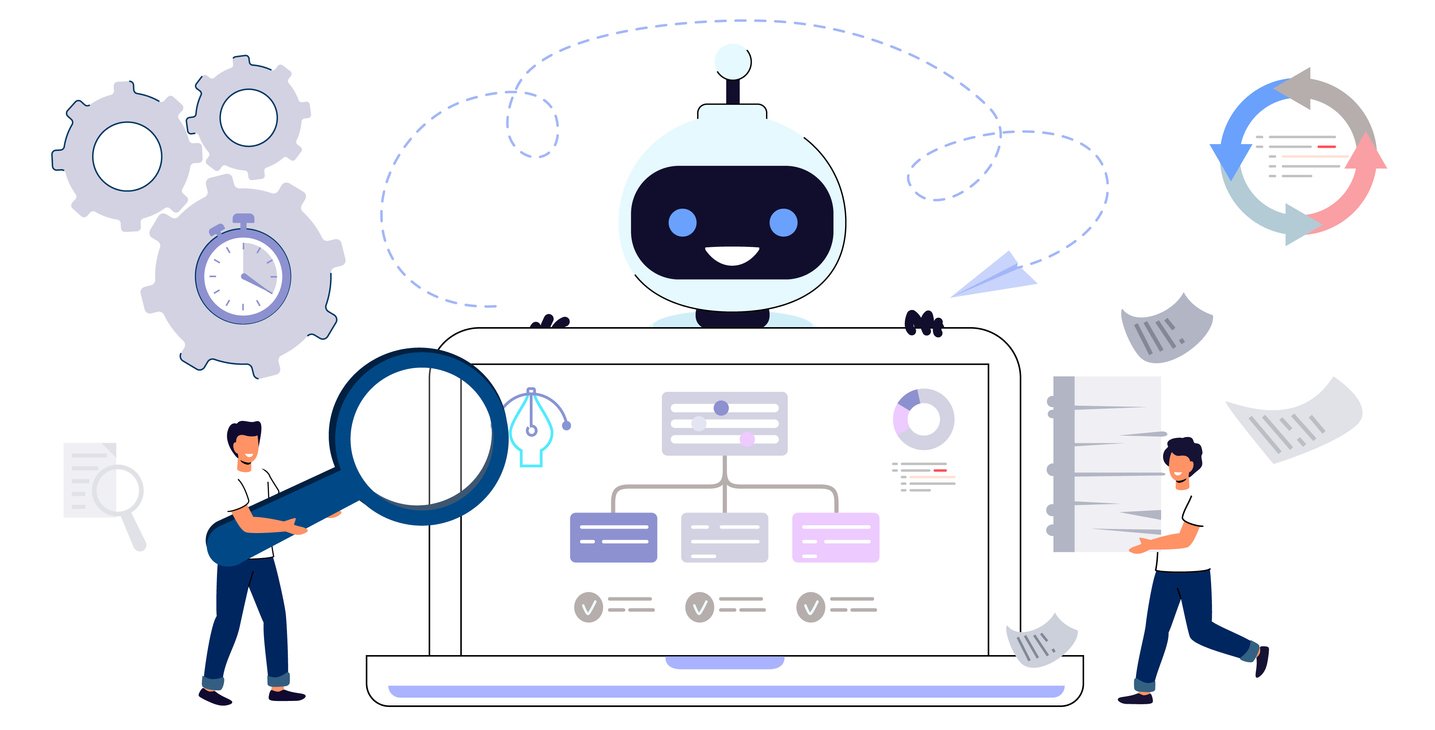
Contact Center Automation Use Cases, Benefits, & Trends
 Updated on
Updated on
 By Bradley Kovacs
By Bradley Kovacs
Bradley Kovacs
Bradley has been passionate about technology since childhood, starting with Microsoft Flight Simulator at age six. In college, he automated his data e...
learn more
Bradley Kovacs
Bradley has been passionate about technology since childhood, starting with Microsoft Flight Simulator at age six. In college, he automated his data e...
Table of Contents
Table of Contents
Customers today are demanding more than ever. They want quick answers, personalized service, and hassle-free experiences. It's a tall order, but businesses are rising to the challenge with a powerful new tool: contact center automation.
Virtual contact center automation is transforming the way companies connect with their customers.
From understanding what it is to explore its real-world impact, especially in healthcare, we'll dive deep into the vertical of contact center automation.
We'll uncover the tools, trends, and challenges shaping this exciting field and see how platforms like Ringy are leading the way.
What Is Contact Center Automation?

Contact center automation is all about using technology to handle customer interactions, allowing you to focus on more complex and meaningful tasks. Think of it as your personal assistant, powered by AI, machine learning, and robotic process automation (RPA), taking care of repetitive, time-consuming work.
When you hear "automation," don't think of it as a replacement but rather as a tool that enhances your abilities. By automating routine inquiries—like answering common questions or routing calls—you can spend more time on tasks that require your unique problem-solving skills.
Contact center and marketing automation don't just make your day easier; they help improve the overall customer experience by ensuring faster, more consistent service.
Let's look at the key technologies of contact center automation:
- Artificial Intelligence (AI) and Machine Learning: AI and machine learning are at the core of contact center automation. These technologies analyze vast amounts of data to recognize patterns and make predictions. For example, AI can predict customer behavior based on previous interactions, enabling the system to suggest personalized responses or solutions. This allows you to provide more accurate and timely assistance, improving the overall customer experience.
- Robotic Process Automation (RPA): RPA is designed to automate repetitive tasks such as data entry, order processing, and call routing. These are tasks that typically consume a significant portion of your day. By automating these processes, RPA reduces the time spent on administrative duties, allowing you to focus on more strategic and customer-focused activities.
- Natural Language Processing (NLP): NLP enables machines to understand, interpret, and respond to human language in a natural and conversational manner. This technology powers AI chatbots and voice assistants, allowing them to engage with customers in real-time, answering questions and providing information. NLP enhances the customer interaction experience by making it more seamless and intuitive, ensuring that customers feel understood and valued.
- Speech Recognition and Voice Biometrics: These technologies are used to analyze spoken language, convert it into text and recognize the speaker's identity. This is particularly useful in verifying customer identity quickly and securely, without requiring lengthy security questions, thereby improving the efficiency of your interactions.
Contact center automation solutions also offer several key benefits that directly impact your day-to-day work, including:
- Increased Efficiency: One of the most significant advantages of automation is the dramatic increase in operational efficiency. Tasks that once took hours can now be completed in minutes. For example, AI-powered chatbots can handle multiple customer inquiries simultaneously, significantly reducing wait times and ensuring that customers receive timely assistance. This efficiency allows you to manage a higher volume of interactions without feeling overwhelmed.
- Cost Savings: Automation can lead to substantial cost savings for your contact center by reducing the need for manual labor and minimizing the occurrence of errors. This, in turn, can lead to better resource allocation and potentially more investment in tools, training, and incentives that enhance your performance and job satisfaction.
- Improved Customer Experience: With automation, customers receive consistent, accurate, and speedy responses, which can greatly enhance their overall experience. Satisfied customers are more likely to remain loyal and recommend the service to others, reflecting positively on your performance as well. Additionally, by automating routine inquiries, you can dedicate more time to addressing complex issues, further improving customer satisfaction.
- Scalability: Automation allows your contact center to handle increased volumes of inquiries without compromising service quality. During peak times or unexpected surges in demand, automated systems can seamlessly manage the load, ensuring that all customer needs are met efficiently. This scalability means you can maintain high standards of service, regardless of the demand.
- 24/7 Availability: Automation ensures that your contact center is operational around the clock, even when you're off the clock. Automated systems can manage inquiries, process orders, and provide information at any time, ensuring that customers always have access to the support they need. This round-the-clock availability enhances customer trust and loyalty, as they know they can rely on your contact center whenever they need assistance.
With these benefits, automation in contact centers isn't just a tool—it's an essential part of your work that helps you achieve better results with less effort.
Contact Center Automation Tools

The tools you'll use in contact center automation are designed to make your job easier and more effective.
Here's what you can expect:
AI Chatbots
AI chatbots are one of the most common and powerful tools in big or small contact center automation. These virtual assistants are capable of handling a wide range of customer interactions, from answering frequently asked questions to guiding customers through basic troubleshooting steps. They operate using natural language processing, which allows them to understand and respond to customer inquiries in a conversational manner.
For example, when a customer asks about the status of an order, an AI chatbot can quickly retrieve the information and provide an update without any manual intervention from you. This not only speeds up the process but also ensures that customers receive accurate information promptly.
When the chatbot encounters a more complex issue requiring human intervention, it can seamlessly escalate the query to you, ensuring the customer receives the necessary support.
Voice Assistants
Voice assistants are another essential tool in the automation arsenal. These systems are designed to handle inbound calls, provide information, manage appointments, or even assist with technical support. They use speech recognition technology to understand and respond to spoken language, making interactions more natural and efficient.
For example, if a customer calls to schedule an appointment, the voice assistant can guide them through the process, confirm availability, and send reminders—all without requiring your input.
Workflow Automation Tools
Workflow automation tools ensure that every customer inquiry is handled efficiently. They automate processes such as:
- Call routing
- Ticket creation
- Follow-up scheduling
You are no longer wasting time on administrative tasks and can focus on what you do best—helping customers.
Analytics Tools
Analytics tools give you insights into customer behavior and preferences. By understanding these patterns, you can tailor your interactions to better meet customer needs, making your job not just easier but more impactful.
These tools are designed with your success in mind. By automating routine tasks and providing you with valuable insights, they empower you to deliver better service while reducing the stress and complexity of your workday.
Embracing these contact center-assisted automation tools means you're not just keeping up with the demands of your role—you're exceeding them.
Contact Center Automation Use Cases

Automation is not just about tools; it's about how those tools are applied in real-life scenarios.
Here are some common use cases where a contact center automation solution can significantly enhance your work:
Customer Support
In customer support, automation can handle routine inquiries, such as frequently asked questions (FAQs), order tracking, and basic troubleshooting. For example, when a customer contacts the center to check the status of an order, an AI chatbot can instantly retrieve and provide the information, freeing you up to handle more complex inquiries.
Additionally, automated systems can escalate issues that require human intervention, ensuring that customers always receive the support they need.
Sales and Lead Generation
Automation plays a crucial role in sales and lead generation by streamlining the process of qualifying leads, scheduling appointments, and following up with prospects. AI-driven tools can analyze customer data to identify the most promising leads, allowing you to focus your efforts on those with the highest potential.
For example, Ringy's sales pipeline management tool automates lead qualification and follow-up, ensuring that you're always working with the best prospects.
Technical Support
For basic troubleshooting, automation can guide customers through solutions, taking care of the simpler cases. When an issue is too complex, the system escalates it to you, ensuring you're only dealing with problems that really need your attention.
Feedback Collection
After you've helped a customer, automated surveys or feedback forms can be sent out to gather their thoughts. This not only helps improve customer satisfaction but also provides you with valuable insights into how well you're doing.
In each of these scenarios, automation doesn't just make your job easier—it makes it more effective. By handling routine tasks and providing you with critical data, these automated systems allow you to focus on what really matters: delivering exceptional service that meets and exceeds customer expectations.
Healthcare Contact Center Automation

In the healthcare industry, contact center automation plays a critical role in managing patient interactions, streamlining processes, and ensuring that patients receive the care they need.
Here are some specific contact center automation examples in the healthcare industry:
Patient Scheduling
Automation simplifies the process of scheduling appointments, reducing the risk of errors and ensuring that patients are seen promptly.
An automated system can:
- Manage appointment bookings
- Send reminders to patients
- Reschedule appointments when necessary
This not only reduces the workload for you but also ensures that patients receive timely care, improving their overall experience. Additionally, by automating the scheduling process, you can focus on more critical tasks, such as providing support to patients with more complex needs.
Prescription Management
In healthcare, managing prescription requests can be time-consuming and prone to errors.
Contact center management and automation can streamline this process by handling prescription refill requests, updating records, and ensuring patients receive their medications on time.
When a patient requests a prescription refill, an automated system can process the request, verify the details, and send it to the appropriate pharmacy. This reduces the need for manual intervention, allowing you to focus on providing more personalized care to patients.
Patient Inquiries
Patients often have questions about their care, treatment options, or general health information. Automation can help manage these inquiries by providing accurate and timely information through AI chatbots or voice assistants.
For example, if a patient contacts the center with a question about their treatment plan, an AI chatbot can provide detailed information based on the patient's records. If the inquiry is more complex, the system can escalate it to you, ensuring that the patient receives the necessary support.
Telehealth Support
As telehealth becomes more popular, contact centers play a crucial role in supporting virtual consultations and follow-ups. Automation can integrate with telehealth platforms to manage appointments, send reminders, and provide support during consultations.
Contact center automation systems can handle the scheduling and follow-up for virtual consultations, ensuring patients receive the care they need without delays. This allows you to focus on providing high-quality care during the consultations, enhancing the overall patient experience.
Contact Center Automation Trends

As an agent, staying ahead of the curve means keeping an eye on trends that will shape your work. These contact center automation trends are not just shaping the future—they're shaping your work today.
By staying informed and embracing these changes, you can ensure that you're always providing the best possible service to your customers.
AI and Machine Learning
AI and machine learning are rapidly transforming the customer service landscape. These powerful technologies are enabling businesses to deliver more personalized, predictive, and efficient support.
By analyzing vast amounts of customer data, AI can anticipate customer needs, allowing you to provide proactive solutions and exceed expectations.
AI and machine learning offer a multitude of benefits for both customers and customer service representatives.
Here's a breakdown of key advantages:
|
Benefit |
Explanation |
|
Personalized Experiences |
AI analyzes customer data to tailor interactions, offering relevant products, recommendations, and support. |
|
Predictive Support |
By identifying patterns in customer behavior, AI can predict potential issues and offer solutions before they escalate. |
|
Increased Efficiency |
Automation of routine tasks frees up agents to focus on complex problems, improving response times and overall efficiency. |
|
Improved Customer Satisfaction |
Proactive support, faster resolutions, and personalized interactions lead to higher customer satisfaction and loyalty. |
|
Data-Driven Insights |
AI provides valuable data on customer preferences, behavior, and trends, enabling businesses to make informed decisions. |
For instance, AI-powered chatbots can handle routine inquiries, freeing up human agents to address more complex issues. Additionally, by analyzing past interactions, AI can identify common problems and develop automated solutions, reducing resolution times and improving customer satisfaction.
In essence, AI and machine learning are not replacing human agents but augmenting their capabilities. By working together, humans and AI can create a seamless and exceptional customer experience.
Omnichannel Automation
Today's consumers expect a seamless and unified customer experience across all touchpoints. This means they want to interact with businesses through their preferred channel, whether it's phone, email, chat, or social media. Omnichannel automation is the key to delivering this expectation.
Omnichannel automation ensures that customer interactions are consistent and efficient, regardless of the channel used.
For example, a customer might initiate a query through live chat, continue the conversation via email, and then resolve the issue over the phone.
With omnichannel automation, all relevant information is transferred between channels, providing agents with a complete view of the customer's history. This eliminates the frustration of repeating information and significantly enhances the overall customer experience.
Let's look at the pros and cons of omnichannel automation.
|
Pros |
Cons |
|
Improved Customer Satisfaction: Consistent experiences, faster resolution times, and reduced frustration lead to higher customer satisfaction. |
Implementation Costs: Implementing omnichannel systems can be expensive, requiring significant investments in technology and training. |
|
Increased Efficiency: Automation streamlines processes, reduces manual tasks and improves agent productivity. |
Complexity: Managing multiple channels and integrating systems can be complex and requires ongoing maintenance. |
|
Data-Driven Insights: Collecting customer data across channels provides valuable insights for improving products and services. |
Dependency on Technology: Reliance on technology can lead to potential system failures or disruptions. |
|
Enhanced Brand Reputation: Delivering exceptional customer experiences builds trust and loyalty, enhancing brand reputation. |
Data Privacy Concerns: Handling customer data across multiple channels requires robust security measures to protect sensitive information. |
By leveraging omnichannel automation, businesses can create a more customer-centric environment, build stronger relationships, and gain a competitive advantage. However, it's essential to carefully consider the potential challenges and invest in the necessary resources to ensure a successful implementation.
Omnichannel automation is no longer a luxury but a necessity in today's customer-driven market.
By providing a seamless and consistent experience across all channels, you can foster loyalty, drive customer satisfaction, and ultimately achieve long-term success.
Personalization
You've likely experienced the power of personalization firsthand. From product recommendations tailored to your browsing history to targeted email campaigns that seem to know your needs, businesses are increasingly leveraging automation to create more meaningful customer interactions.
At its core, personalization is about treating each customer as a unique individual. By harnessing the potential of CRM contact center automation, businesses can delve deep into customer data to uncover hidden insights. This knowledge empowers them to deliver experiences that resonate on a personal level. It's no longer sufficient to simply address customers by name; you must truly understand their preferences, anticipate their needs, and provide solutions that align perfectly with their specific circumstances.
Imagine receiving recommendations for products or services that exactly match your interests, or being offered support precisely when you need it most. This level of tailored engagement fosters a sense of value and trust, transforming casual customers into loyal advocates.
Let's explore a few examples:
- E-commerce: Imagine visiting an online clothing store and finding outfits curated based on your style preferences, past purchases, and even the weather in your location. This level of personalization not only enhances the shopping experience but also boosts sales.
- Healthcare: Consider a healthcare provider using patient data to develop personalized treatment plans and medication regimens. This approach can improve patient outcomes and satisfaction while reducing costs.
- Finance: Financial institutions can leverage personalization to offer tailored investment advice, fraud prevention, and personalized loan offers. This builds trust and loyalty among customers.
Understanding and catering to individual needs and preferences can foster deeper connections, increase customer loyalty, and gain a competitive edge.
As technology continues to advance, the possibilities for personalized experiences will only expand, making it essential for businesses to embrace this transformative approach.
Cloud-Based Solutions
The shift towards remote work has transformed the landscape of contact centers, making cloud-based solutions more essential than ever. As a contact center agent, you've probably experienced the growing need for flexibility in your work environment. Cloud-based contact center solutions provide just that. These systems give you the freedom to work from virtually anywhere, whether it's your home, a coffee shop, or even another country. You no longer need to be tied to a physical office to access the tools and information you need to do your job effectively.
One key advantage of cloud contact center solutions is scalability. As the demand for customer support fluctuates, especially during peak seasons or unexpected surges, cloud-based systems can scale up or down in real-time. No matter how many customers are reaching out, you and your team can handle the workload without disruptions or delays. You're empowered to provide consistent, high-quality service without being overwhelmed by an influx of calls or messages.
Additionally, cloud contact center providers ensure that all the essential tools and information are always at your fingertips, no matter where you are.
Whether you're managing customer inquiries, updating records, or accessing important analytics, everything is securely stored and easily accessible through the cloud. This connectivity enables seamless collaboration between you and your colleagues, even if you're scattered across different locations. You can share insights, escalate issues, and work together to resolve customer concerns as efficiently as you would in a traditional office setting.
Self-Service Options
You've likely noticed a growing trend: customers are increasingly opting to find answers on their own rather than speaking to a live agent. This shift towards self-service is driven by a desire for speed, convenience, and independence. As a result, contact centers are evolving to meet this changing customer expectation.
By offering robust self-service options, contact centers can empower customers to resolve routine inquiries independently. This includes providing access to frequently asked questions (FAQs), knowledge bases, and interactive tools like chatbots. By handling these common issues through automation, contact center agents can focus their attention on more complex problems that require human expertise.
The benefits of self-service are twofold.
First, it enhances customer satisfaction by offering immediate access to information and solutions. Customers appreciate the ability to find answers quickly and efficiently, without the need to wait on hold. Secondly, it improves operational efficiency by reducing call volume and allowing agents to handle more challenging issues.
To successfully implement self-service, contact centers must prioritize the following:
- User-friendly design: Ensure self-service options are intuitive and easy to navigate.
- Comprehensive knowledge base: Provide a wealth of information to address common customer questions.
- Intelligent automation: Utilize AI-powered tools like chatbots to handle complex inquiries.
- Seamless integration: Connect self-service options to other customer support channels for a unified experience.
By investing in self-service, contact centers can create a win-win situation for both customers and agents.
Contact Center Automation - Final Thoughts

As contact center automation continues to evolve, staying informed and adopting these technologies will be crucial for maintaining a competitive edge. By leveraging the power of AI, machine learning, and RPA, contact centers can improve efficiency, reduce costs, and enhance customer satisfaction.
If you're ready to take your contact center to the next level, check out our sales software CRM, Ringy.
It offers features like VoIP calling, sales pipeline management, and powerful insights.
Ringy is a one-way ticket to maximizing your CRM productivity and automating your contact center.
What are you waiting for?
Request a demo to experience the next level of contact center automation.

Skyrocket your sales with the CRM that does it all.
Calling? Check. SMS? Check. Automation and AI? Check. Effortlessly keep in touch with your customers and boost your revenue without limits.

Take your sales to new heights with Ringy.
Sales in a slump? Ringy gives you the tools and flexibility you need to capture leads, engage with them, and turn them into customers.
Subscribe to Our Blog
Enter your email to get the latest updates sent straight to your inbox!
Categories
Related Articles






































































